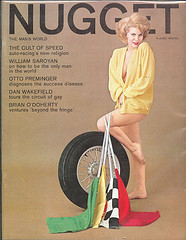Forbes’ Flawed Report on NPR and Sourcing by Gender
Today saw a bumper crop of weak content masquerading as journalism. I’m really perturbed about one article in particular.
Forbes—the business magazine led by zillionaire libertarian CEO and editor-in-chief Steve Forbes—published an article noting that NPR’s reporting had a gender bias in its sourcing. The report was written by contributor Michael Howe, whose bio at Forbes characterizes him as the “lead shepherd of the 4th Estate Project.” The 4th Estate Project released several interesting studies, including one last June detailing the media’s overall gender bias in using women as news sources for election coverage. It was a laudable effort in concept to encourage awareness of diversity in media.
The 4th Estate Project continued to follow NPR’s coverage through the election season to watch for gender bias. In a nutshell, the bias noted across other commercial outlets in frequency of quoting males over females also appears in NPR’s coverage. Not a good thing, on the face of it.
But there are problems with this particular report in Forbes and 4th Estate Project:
1) The magazine has an inherent gender bias of its own, not spelled out clearly by contributor Howe. With the overwhelming majority of medium-to-large corporations in this country lacking female board members and even fewer CEOs, Forbes’ own sourcing for business news is automatically biased by the current structure of this country’s businesses.
[Which begs the question: Is it at all possible that reporting on elections is similarly biased, because there are too few women in government or in politics? 4th Estate Project may have screened out statements by candidates, but did they screen out statements from past office holders, or prospective candidates who were assisting then-prospective candidates?]
2) Forbes’ editor-in-chief has a known bias as a libertarian conservative (though he once ran for president under the GOP); his ideological bent against taxes may manifest in a bias against NPR as a publicly-funded news outlet. Howe’s piece does not disclose Forbes’ ideology or the possibility that the magazine has a similar bias; he doesn’t appear to question why Forbes magazine would be so interested in coverage of this single outlet’s continued performance up through the November election after the 4th Estate Project’s June 2012 report.
3) NPR is a competitor to Forbes; they may not operate in exactly the same market niche, but they both do reporting on business and politics. In this particular piece by Howe, Forbes questions the diversity of a single competitor, yet we can only assume that Howe and Forbes both believe their readers fully understand this relationship. Read more →

